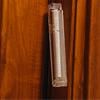Jewish sources give many reasons for the commandment of mezuzah: it is a reminder of the oneness of G‑d; it is a protection for the Jewish home and its inhabitants, and so on. All these reasons, however, would apply primarily to the mezuzah installed at the outside entrance to the house. The Torah, however, clearly instructs us to attach the mezuzah on all of the doorposts of the house: "And you shall inscribe them on the doorposts of your home"1 — the word mezuzot, doorposts, appears in plural. What may be the rationale for affixing mezuzot on the inside doorposts of the rooms of the house?
Before this question may be answered, we first must understand the meaning of a room. Why do we have different rooms in our houses? Obviously, they each serve a different purpose. The living room, the kitchen, the dinning room, the bedroom — each houses and serves a different aspect of our lives. On the most basic level we might say that the mezuzah affixed at the entrance of each room dedicates that room with its distinct purpose to G‑d.
This fragmentation of space, however, may also cause a certain fragmentation of consciousness. Just as a manner of dress appropriate for one room may not be appropriate for another (it may not be appropriate to sit in pajamas in the formal dining room, although now these rules are less strictly observed), a transition from one room to another may also require a change in the state of mind.
From a spiritual perspective, this fragmentation of consciousness is even more pronounced. A person’s life is viewed as an exercise in avodah, the service of G‑d. Consequently, different activities conducted in different rooms represent different modes of Divine service. Moreover, as a person was created to serve his Creator, his or her very nature and being is associated with this service. Thus, when the mode of this service changes, so changes his psyche and, indeed, his very persona.
The Talmud states, "A man should not take leave of his friend except through a statement of Halachah, because through that statement he will remember him."2 The plain meaning of this dictum is that when two Jews part they should exchange the words of Torah, and, more specifically, Halachah (a ruling of Torah law), and through that they will remain connected.
The Lubavitcher Rebbe offers a deeper insight into this Talmudic saying. The two "friends" who are parting, says the Rebbe, could also be seen as two aspects of yourself — the same person, but separated in time. Each day, according to the Zohar, brings its own purpose in the Divine service. Hence, we evolve with time - each day we are a new person. In order that there be no separation in consciousness from day to day, an individual should connect these two identities through the learning the laws of Halachah.3
This sheds light on why each room requires a mezuzah. As a person moves from room to room his consciousness changes. As he steps over the threshold separating the two rooms, it is as if he is "a man taking leave of his friend," — he is parting from his former persona associated with purpose of the room he is leaving. To heal this fragmentation of consciousness and to assure the continuity of Divine service, the words of Torah inscribed in the mezuzah are affixed to the doorpost. The mezuzah joins the distinct rooms into a unified dwelling place for G‑d. It also reconnects our fragmented consciousness, assuring a continuity of Divine service.
Thus the mezuzah is a unifying agent in all three dimensions enumerated in Sefer Yetzirah: space, time and soul (olam, shana, nefesh). In the domain of time, the mezuzah reconnects our consciousness from day to day, each day having its unique purpose and service; in the domain of space the mezuzah stitches together the distinct patches of space into a quilt we call a house; and in the domain of spirit, it reconnects our fragmented consciousness into a wholesome self. Perhaps this is why the verses inscribed in this unifying agent, the mezuzah, begin with the Shema Yisrael — a proclamation of the unity of G‑d, from which all unity flows.








Join the Discussion